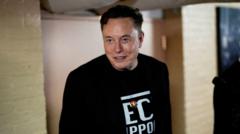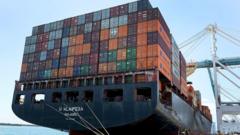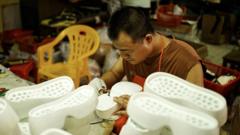The public exchange underscores a widening rift between Musk and Trump's trade team regarding tariffs and manufacturing.
Musk Critiques Trump Trade Advisor Navarro's Remarks on Tesla

Musk Critiques Trump Trade Advisor Navarro's Remarks on Tesla
Elon Musk rebuffs Peter Navarro's comments, highlighting tensions over U.S. trade policy.
Elon Musk has publicly criticized Peter Navarro, President Trump’s trade advisor, labeling him a “moron” over comments regarding Tesla's manufacturing practices. Musk's remarks, made on his social media platform X, followed an interview in which Navarro described Tesla not as a car manufacturer but as merely a “car assembler.” This criticism arose during Navarro's discussion on Trump’s ambitious tariff policy aimed at boosting U.S. manufacturing.
In response to Navarro's claims, Musk refuted them as “demonstrably false” and emphasized Tesla’s integration of U.S.-made parts, referencing a 2023 report from Kelley Blue Book which stated that Tesla vehicles hold the highest percentage of American-made components among automakers. This public spout between Musk and Navarro represents a significant moment of discontent, especially considering that Musk also plays a role within the Trump administration as head of the Department of Government Efficiency (Doge), which focuses on reducing federal spending.
White House representative Karoline Leavitt acknowledged the ongoing disagreements between the two, suggesting that their contrasting viewpoints will continue to unfold publicly. Navarro is known for his strong loyalty to Trump and has been a driving force behind the current tariff strategy. He argued on CNBC that the U.S. auto industry is overly reliant on foreign parts and needs to shift towards domestic production to improve wages and profits.
Analysts highlight that while Tesla may appear less vulnerable to tariffs compared to traditional U.S. car manufacturers, the company's reliance on foreign supply chains, particularly from China, could still pose significant risks. Jeffrey Sonnenfeld, a professor at Yale, noted that many business leaders are uneasy about the ramifications of Trump’s trade policies, feeling embarrassed on the global stage.
Musk has previously hinted at his dissatisfaction with tariffs and their impact on profit margins. Notably, billionaire investor Bill Ackman has also called for a reevaluation of the tariff strategy to avoid potentially dire economic consequences. As tensions linger, the impact of these tariffs on the broader economy and the individual stakeholders tied to Trump’s administration remains a central issue.
In response to Navarro's claims, Musk refuted them as “demonstrably false” and emphasized Tesla’s integration of U.S.-made parts, referencing a 2023 report from Kelley Blue Book which stated that Tesla vehicles hold the highest percentage of American-made components among automakers. This public spout between Musk and Navarro represents a significant moment of discontent, especially considering that Musk also plays a role within the Trump administration as head of the Department of Government Efficiency (Doge), which focuses on reducing federal spending.
White House representative Karoline Leavitt acknowledged the ongoing disagreements between the two, suggesting that their contrasting viewpoints will continue to unfold publicly. Navarro is known for his strong loyalty to Trump and has been a driving force behind the current tariff strategy. He argued on CNBC that the U.S. auto industry is overly reliant on foreign parts and needs to shift towards domestic production to improve wages and profits.
Analysts highlight that while Tesla may appear less vulnerable to tariffs compared to traditional U.S. car manufacturers, the company's reliance on foreign supply chains, particularly from China, could still pose significant risks. Jeffrey Sonnenfeld, a professor at Yale, noted that many business leaders are uneasy about the ramifications of Trump’s trade policies, feeling embarrassed on the global stage.
Musk has previously hinted at his dissatisfaction with tariffs and their impact on profit margins. Notably, billionaire investor Bill Ackman has also called for a reevaluation of the tariff strategy to avoid potentially dire economic consequences. As tensions linger, the impact of these tariffs on the broader economy and the individual stakeholders tied to Trump’s administration remains a central issue.





















